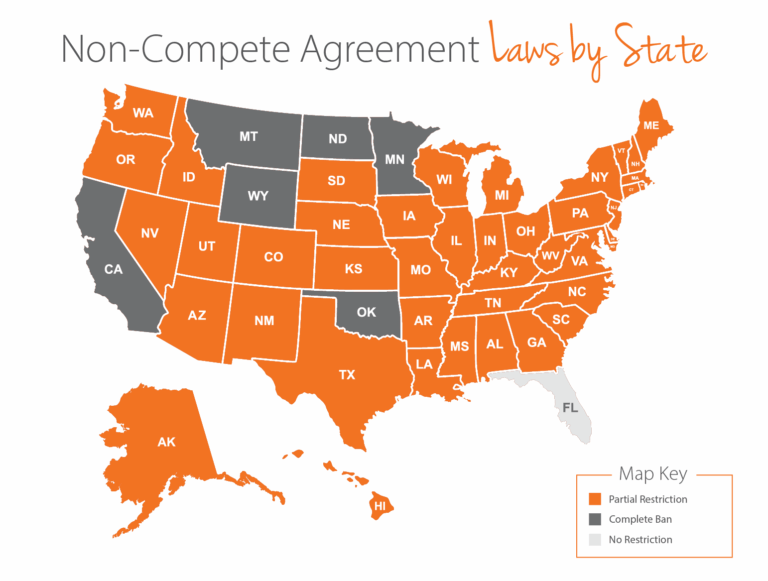Whether you can require employees to sign a non-compete agreement varies by state, with some states implementing restrictions and others banning them outright. Regulations for non-competes are evolving, both at the federal and state level, making it hard to keep up.
Read on for a comprehensive guide to non-compete agreement laws by state.
What is a Non-Compete Agreement?
A non-compete agreement is a legal contract between an employer and employee that restricts the employee’s ability to work for competitors, start a competing business, or engage in competitive activities for a specified period after leaving their current position. These agreements typically include three key elements:
- Geographic Scope: Defines the physical area where the restrictions apply, which could range from a specific city to an entire state or region.
- Duration: Specifies how long the restrictions remain in effect after employment ends, commonly ranging from six months to two years.
- Scope: Details what specific competitive activities are prohibited, such as working for direct competitors, soliciting customers, or using proprietary knowledge.
Non-Compete Agreement vs Non-Disclosure
Non-compete and non-disclosure agreements serve fundamentally different purposes. Non-competes restrict where you can work by preventing employment with competitors or starting competing businesses, while non-disclosure agreements (NDAs) restrict what information you can share to protect confidential information and trade secrets.
For example, a non-compete might prevent you from working for any competing software company within 50 miles for 18 months, while an NDA would prevent you from sharing customer lists or technical specifications regardless of where you work. Many employers are shifting toward NDAs as non-compete restrictions increase, since NDAs face fewer legal challenges while still protecting sensitive business information.
Categories of Non-Compete Agreement by State

States approach non-compete agreements in vastly different ways. These laws generally fall into three categories: complete bans, partial restrictions, or no significant restrictions. Understanding where each state falls can help employers navigate the enforceability of such agreements.
Complete Ban
Some states have entirely banned non-compete agreements, deeming them unenforceable regardless of industry or role. These states prioritize worker mobility and believe that non-competes limit economic opportunity.
Partial Restriction
Many states permit non-compete agreements, but impose limitations. These might include restrictions based on salary thresholds, job duties, geographic scope, or time duration. Courts often assess whether the agreement is reasonable and necessary to protect legitimate business interests.
No Restriction
Otherwise known as enforceable, some states choose not to limit non-compete agreements. Courts typically uphold non-competes if they protect trade secrets, client relationships, or proprietary information.
Non-Compete Agreement Laws by State
The following chart outlines which states allow or ban non-compete clauses, with details on non-compete restrictions.
Note: Many states note non-competes must be “reasonable,” but don’t define this. Generally, the more specific a non-compete is, the more reasonable it is considered. Non-compete agreements that are broad in nature are typically unenforceable.
| State | Category | Description |
| Alabama | Partial Restriction | Non-compete agreements are unenforceable unless they represent a protectable interest, which is defined as one that includes trade secrets, confidential information, commercial relationships, and goodwill. |
| Alaska | Partial Restriction | Must be reasonable in scope and duration, and protect legitimate business interests. |
| Arizona | Partial Restriction | Must be reasonable in scope and duration, and protect legitimate business interests. |
| Arkansas | Partial Restriction; Ban for Physicians | Must be reasonable in scope and duration, and protect legitimate business interests. Complete ban for physicians. |
| California | Complete Ban | Non-competes are void. |
| Colorado | Partial Restriction | Most are void, except cases involving highly compensated workers or trade secrets. |
| Connecticut | Partial Restriction | Must be considered reasonable in scope and duration. |
| Delaware | Partial Restriction | Must be reasonable in scope and duration, and protect legitimate business interests. |
| Florida | No Restriction | Actively enforces non-competes up to four years as long as employee was given seven days to review before signing. |
| Georgia | Partial Restriction | Must be reasonable in scope and duration, and protect legitimate business interests. |
| Hawaii | Partial Restriction; Ban for Tech Workers | Must be reasonable in scope and duration, and protect legitimate business interests. Non-competes are banned for high-tech workers. |
| Idaho | Partial Restriction | Must be reasonable in duration (18 months or less), scope, and geography. |
| Illinois | Partial Restriction | Banned for workers under a salary threshold; written notice required. |
| Indiana | Partial Restriction; Ban for Physicians | Must be reasonable in scope and duration, and protect legitimate business interests. Complete ban for physicians. |
| Iowa | Partial Restriction Banned for Certain Health Workers | Must be reasonable in scope and duration, and protect legitimate business interests. Banned for mental health professionals and temporary health employees. |
| Kansas | Partial Restriction | Must be reasonable in scope and duration, and protect legitimate business interests. |
| Kentucky | Partial Restriction | Allowed if reasonable; courts weigh business protection vs. employee rights. |
| Louisiana | Partial Restriction | Must meet strict statutory requirements, including geographic limits and a limit of two years. |
| Maine | Partial Restriction; Banned for Veterinarians | Must be reasonable in scope and duration, and protect legitimate business interests. Not enforceable for employees earning at or below 400% of federal poverty level. |
| Maryland | Partial Restriction; Banned for Veterinary Workers | Banned for workers earning 150% of minimum wage or less, veterinary workers, and health professionals making $350,000 or less annually. |
| Massachusetts | Partial Restriction; Banned for Numerous Health Care and Broadcasting Workers | Requires consideration, notice, and must be reasonable in scope and duration. Banned for numerous workers, including physicians, nurses, and psychologists. |
| Michigan | Partial Restriction | Must be reasonable in scope, geography, and duration, and protect legitimate business interests. |
| Minnesota | Complete Ban | Non-competes banned as of July 1, 2023. |
| Mississippi | Partial Restriction | Must be reasonable in scope, geography, and duration, and protect legitimate business interests. Wage restrictions apply, and employees must receive consideration for signing. |
| Missouri | Partial Restriction | Must be reasonable in scope, geography, and duration, and protect legitimate business interests. |
| Montana | Complete Ban | Contracts that restrain trade are generally void. |
| Nebraska | Partial Restriction | Must be reasonable in scope, geography, and duration, and protect legitimate business interests. |
| Nevada | Partial Restriction; Banned for Hourly Workers | Must be reasonable in scope, geography, and duration, and protect legitimate business interests. Cannot be imposed on hourly workers. |
| New Hampshire | Partial Restriction | Must provide advance notice and consideration; banned for low-wage workers. |
| New Jersey | Partial Restriction | Must be reasonable in scope, geography, and duration, and protect legitimate business interests. |
| New Mexico | Partial Restriction; Banned for Health Care Workers | Must be reasonable in scope, geography, and duration, and protect legitimate business interests. Banned for health care workers. |
| New York | Partial Restriction | Must be reasonable in scope, geography, and duration, and protect legitimate business interests. |
| North Carolina | Partial Restriction | Must be reasonable in scope, geography, and duration, and protect legitimate business interests. Employees must receive consideration for signing. |
| North Dakota | Complete Ban | Non-competes banned except in sale-of-business scenarios. |
| Ohio | Partial Restriction | Must be reasonable in scope, geography, and duration, and protect legitimate business interests. |
| Oklahoma | Complete Ban | Non-competes are void. |
| Oregon | Partial Restriction | Income threshold, time limit, and written notice required. |
| Pennsylvania | Partial Restriction; Banned for Health Care Workers | Must be reasonable in scope, geography, and duration, and protect legitimate business interests. Banned for health care practitioners. |
| Rhode Island | Partial Restriction; Banned for Nurses | One year maximum. Banned for non-exempt workers, those earning 250% below the federal poverty level, and nurses. |
| South Carolina | Partial Restriction | Must be reasonable in scope, geography, and duration, and protect legitimate business interests. |
| South Dakota | Partial Restriction | Limited to two years. |
| Tennessee | Partial Restriction | Must be reasonable in scope, geography, and duration, and protect legitimate business interests. |
| Texas | Partial Restriction | Must be reasonable in scope, geography, and duration, and protect legitimate business interests. |
| Utah | Partial Restriction | Enforceable up to one year and must be reasonable in scope and geography. |
| Vermont | Partial Restriction | Must be reasonable in scope, geography, and duration, and protect legitimate business interests. |
| Virginia | Partial Restriction; Banned for Low-Wage Workers. | Must be reasonable in scope, geography, and duration. Prohibited for non-exempt employees or those earning less than the Commonwealth’s average weekly wage. |
| Washington | Partial Restriction | Income threshold and 18-month limit apply; must provide notice. |
| West Virginia | Partial Restriction | Permitted if reasonable and necessary for employer protection. For physicians, cannot be longer than a year or more than 30 miles. |
| Wisconsin | Partial Restriction | Must be reasonable in scope, geography, and duration, and protect legitimate business interests. |
| Wyoming | Complete Ban | Starting July 1, 2025, noncompete clauses are void with limited exceptions for trade secrets or executive or management personnel. |
Which States Have Non-Compete Agreement Laws?
While most non-compete laws are vague and up to interpretation, the majority of states still have them. In fact, the only state with no restriction is Florida. The restrictions are very minimal in certain states though, such as Nebraska, Kansas, and Wisconsin.
Which States Have Banned Non-Competes?
Non-competes are banned in California, Minnesota, Montana, North Dakota, Oklahoma, and Wyoming. Other states ban non-competes for certain industries or income thresholds. For example, Arkansas bans non-compete agreements for physicians. Virginia bans non-competes for those earning less than the Commonwealth’s average weekly wage.
What States Allow Non-Compete Agreements?
Besides the six states that ban non-competes, all other states allow non-compete agreements, though there are limits. Most states note they must be reasonable to be enforceable.
In What States Are Non-Competes Enforceable?
Again, non-competes can be enforced in most states, excluding the six with non-compete bans.
Stay Compliant with Non-Compete Agreement Laws Across States
Navigating non-competes can be tricky, especially for companies operating in multiple states. And there are also federal laws to consider. For example, the Federal Trade Commission issued a rule intended to ban non-competes in 2024. However, a District Court ruling struck down the ban. The FTC has appealed the decision, but no further action has been taken.
To stay up to date on non-compete legislation, you need a compliance expert on board. At Paycor, we’re proud to help 30,000+ customers stay updated and informed on compliance regulations. Learn more with a guided product tour.








